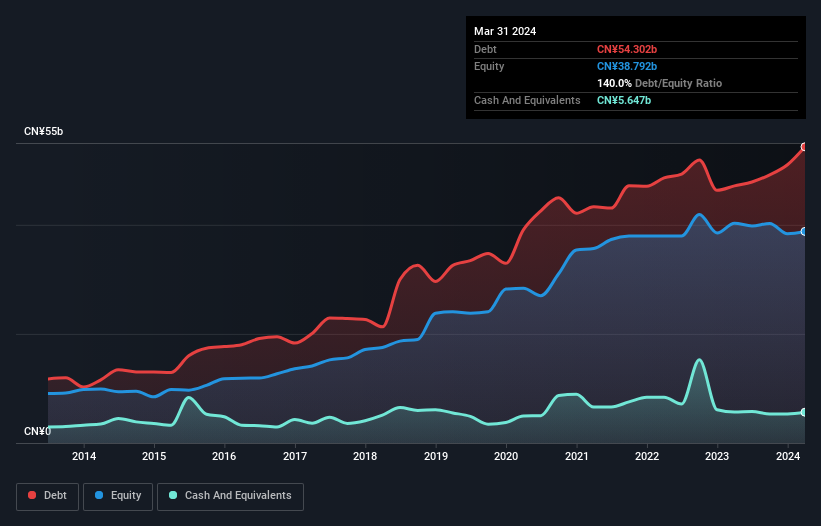- China
- /
- Water Utilities
- /
- SHSE:600008
These 4 Measures Indicate That Beijing Capital Eco-Environment Protection Group (SHSE:600008) Is Using Debt In A Risky Way

The external fund manager backed by Berkshire Hathaway's Charlie Munger, Li Lu, makes no bones about it when he says 'The biggest investment risk is not the volatility of prices, but whether you will suffer a permanent loss of capital.' So it seems the smart money knows that debt - which is usually involved in bankruptcies - is a very important factor, when you assess how risky a company is. We note that Beijing Capital Eco-Environment Protection Group Co., Ltd. (SHSE:600008) does have debt on its balance sheet. But should shareholders be worried about its use of debt?
What Risk Does Debt Bring?
Generally speaking, debt only becomes a real problem when a company can't easily pay it off, either by raising capital or with its own cash flow. If things get really bad, the lenders can take control of the business. However, a more common (but still painful) scenario is that it has to raise new equity capital at a low price, thus permanently diluting shareholders. Having said that, the most common situation is where a company manages its debt reasonably well - and to its own advantage. When we examine debt levels, we first consider both cash and debt levels, together.
See our latest analysis for Beijing Capital Eco-Environment Protection Group
What Is Beijing Capital Eco-Environment Protection Group's Debt?
You can click the graphic below for the historical numbers, but it shows that as of March 2024 Beijing Capital Eco-Environment Protection Group had CN¥54.3b of debt, an increase on CN¥47.1b, over one year. However, it also had CN¥5.65b in cash, and so its net debt is CN¥48.7b.

A Look At Beijing Capital Eco-Environment Protection Group's Liabilities
According to the last reported balance sheet, Beijing Capital Eco-Environment Protection Group had liabilities of CN¥28.2b due within 12 months, and liabilities of CN¥43.6b due beyond 12 months. Offsetting these obligations, it had cash of CN¥5.65b as well as receivables valued at CN¥19.2b due within 12 months. So its liabilities total CN¥47.0b more than the combination of its cash and short-term receivables.
This deficit casts a shadow over the CN¥21.1b company, like a colossus towering over mere mortals. So we definitely think shareholders need to watch this one closely. At the end of the day, Beijing Capital Eco-Environment Protection Group would probably need a major re-capitalization if its creditors were to demand repayment.
We use two main ratios to inform us about debt levels relative to earnings. The first is net debt divided by earnings before interest, tax, depreciation, and amortization (EBITDA), while the second is how many times its earnings before interest and tax (EBIT) covers its interest expense (or its interest cover, for short). This way, we consider both the absolute quantum of the debt, as well as the interest rates paid on it.
Beijing Capital Eco-Environment Protection Group has a rather high debt to EBITDA ratio of 6.3 which suggests a meaningful debt load. However, its interest coverage of 2.8 is reasonably strong, which is a good sign. Notably, Beijing Capital Eco-Environment Protection Group's EBIT was pretty flat over the last year, which isn't ideal given the debt load. When analysing debt levels, the balance sheet is the obvious place to start. But it is Beijing Capital Eco-Environment Protection Group's earnings that will influence how the balance sheet holds up in the future. So if you're keen to discover more about its earnings, it might be worth checking out this graph of its long term earnings trend.
Finally, a business needs free cash flow to pay off debt; accounting profits just don't cut it. So we always check how much of that EBIT is translated into free cash flow. During the last three years, Beijing Capital Eco-Environment Protection Group burned a lot of cash. While that may be a result of expenditure for growth, it does make the debt far more risky.
Our View
On the face of it, Beijing Capital Eco-Environment Protection Group's conversion of EBIT to free cash flow left us tentative about the stock, and its level of total liabilities was no more enticing than the one empty restaurant on the busiest night of the year. Having said that, its ability to grow its EBIT isn't such a worry. We should also note that Water Utilities industry companies like Beijing Capital Eco-Environment Protection Group commonly do use debt without problems. After considering the datapoints discussed, we think Beijing Capital Eco-Environment Protection Group has too much debt. That sort of riskiness is ok for some, but it certainly doesn't float our boat. There's no doubt that we learn most about debt from the balance sheet. However, not all investment risk resides within the balance sheet - far from it. We've identified 3 warning signs with Beijing Capital Eco-Environment Protection Group (at least 1 which shouldn't be ignored) , and understanding them should be part of your investment process.
If you're interested in investing in businesses that can grow profits without the burden of debt, then check out this free list of growing businesses that have net cash on the balance sheet.
Valuation is complex, but we're here to simplify it.
Discover if Beijing Capital Eco-Environment Protection Group might be undervalued or overvalued with our detailed analysis, featuring fair value estimates, potential risks, dividends, insider trades, and its financial condition.
Access Free AnalysisHave feedback on this article? Concerned about the content? Get in touch with us directly. Alternatively, email editorial-team (at) simplywallst.com.
This article by Simply Wall St is general in nature. We provide commentary based on historical data and analyst forecasts only using an unbiased methodology and our articles are not intended to be financial advice. It does not constitute a recommendation to buy or sell any stock, and does not take account of your objectives, or your financial situation. We aim to bring you long-term focused analysis driven by fundamental data. Note that our analysis may not factor in the latest price-sensitive company announcements or qualitative material. Simply Wall St has no position in any stocks mentioned.
About SHSE:600008
Beijing Capital Eco-Environment Protection Group
Beijing Capital Eco-Environment Protection Group Co., Ltd.
Solid track record, good value and pays a dividend.
Market Insights
Community Narratives



